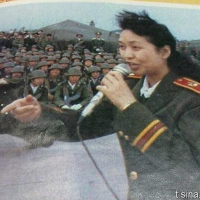China’s Brutal Past Haunts the Present: First Lady Sang to Murderous Troops; Boy Sent Mother to her Death
 Peng Liyuan singing to Chinese troops in Tiananmen Square
Peng Liyuan singing to Chinese troops in Tiananmen Square
Some of China’s most brutal episodes from its recent past have been revived in recent stories involving the government’s new first lady and a 60-year-old survivor of the Cultural Revolution.
Peng Liyuan, wife of President Xi Jinping, briefly became a hot topic of discussion on China’s heavily censored Internet after an old photo of hers surfaced briefly.
The image showed Peng from June 1989, when she sang to the Chinese troops who carried out the bloody crackdown against pro-democracy demonstrators in Tiananmen Square.
The photo didn’t remain online for very long, but it lasted enough time for many to see it and wonder who the first lady really is, given the friendly image that the government has portrayed of Peng.
China’s cruel past also resurfaced in the story of Zhang Hongbing, who, at the age of 16, denounced his mother during the upheaval of the Cultural Revolution after she burned a photo of Mao Zedong in 1970.
His actions, along with that of his father, led to the death of his mother, Fang Zhongmou, who was subjected to beatings and public humiliation before facing a firing squad.
Ten years later, Fang was officially rehabilitated. Haunted by what he did, Zhang is now trying to atone by calling for the preservation of his mother’s grave in their hometown of Guzhen, central Anhui province, as a cultural relic.
Human rights abuses continue in China. According to the U.S. State Department’s latest human rights report on China, “As in previous years, citizens did not have the right to change their government. Other human rights problems during the year included: extrajudicial killings, including executions without due process; enforced disappearance and incommunicado detention, including prolonged illegal detentions at unofficial holding facilities known as “black jails”; torture and coerced confessions of prisoners; detention and harassment of lawyers, journalists, writers, dissidents, petitioners, and others who sought to peacefully exercise their rights under the law; a lack of due process in judicial proceedings; political control of courts and judges; closed trials; the use of administrative detention; restrictions on freedom to assemble, practice religion, and travel; failure to protect refugees and asylum seekers; pressure on other countries to forcibly return citizens to China; intense scrutiny of and restrictions on nongovernmental organizations (NGOs); discrimination against women, minorities, and persons with disabilities; a coercive birth limitation policy that in some cases resulted in forced abortion or forced sterilization; trafficking in persons; prohibitions on independent unions and a lack of protection for workers’ right to strike; and the use of forced labor, including prison labor. Corruption remained widespread.”
-Noel Brinkerhoff
To Learn More:
Past As Military Propaganda Singer Complicates First Lady’s Emergence As Icon Of Softer China (Associated Press)
China's Cultural Revolution: Son's Guilt Over The Mother He Sent To Her Death (by Tania Branigan, The Guardian)
Country Reports on Human Rights Practices for 2011-China (State Department)
- Top Stories
- Unusual News
- Where is the Money Going?
- Controversies
- U.S. and the World
- Appointments and Resignations
- Latest News
- Musk and Trump Fire Members of Congress
- Trump Calls for Violent Street Demonstrations Against Himself
- Trump Changes Name of Republican Party
- The 2024 Election By the Numbers
- Bashar al-Assad—The Fall of a Rabid AntiSemite






Comments